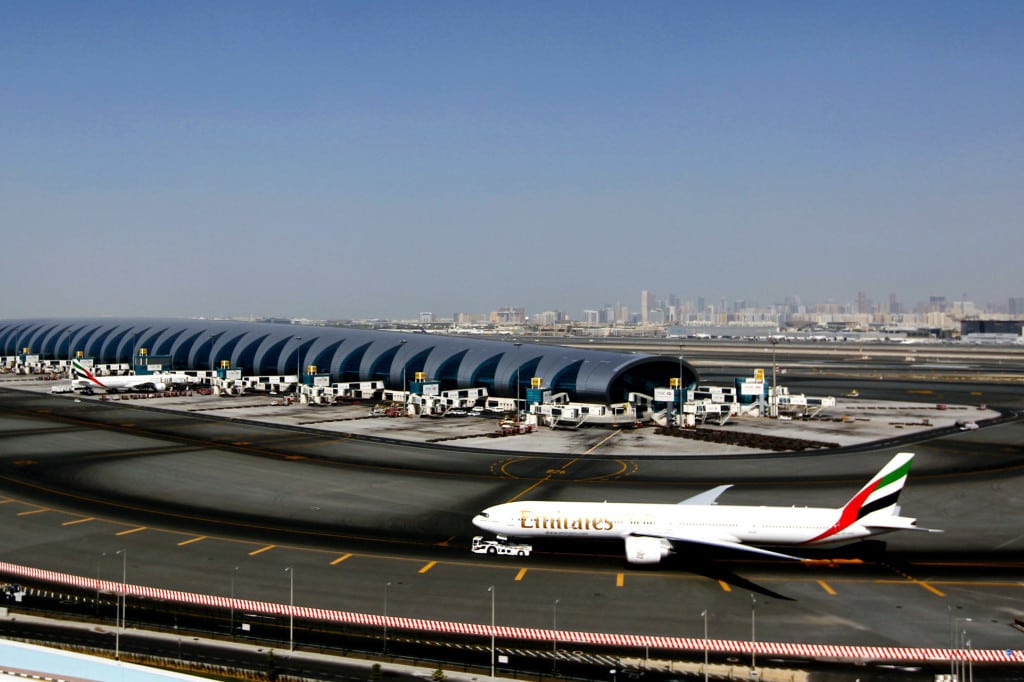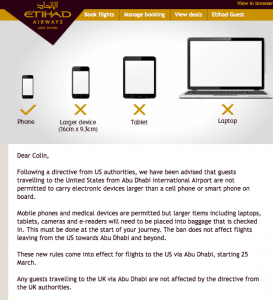Skift Take
Many industry insiders are surprised the U.S. electronics ban includes flights from Dubai, Doha, and Abu Dhabi. Is there a valid security concern for adding those airports? Or could something more sinister be taking place?
It’s hard to know what to make of the recently announced laptop ban. But it doesn’t smell right. Effective March 25th, passengers flying from eight countries will have to put laptops and other devices larger than a cell phone in checked luggage down below.
It is devastating for business travelers who would want to be productive during the 15 plus hour flight. It also creates incredibly difficult logistical complications for the affected airlines. The knock-on effect is huge, and there’s no sign of it subsiding.
U.S. officials, citing security, haven’t confirmed anything specific in terms of the threat. And we shouldn’t expect them to anytime in the future. This is business as usual for the intelligence world, and I’m not criticizing that.
However, the biggest hint to what is really going on can be seen in the UK reaction to the threat. We know the intelligence agencies between the two countries typically align and share analysis closely. So it is revealing indeed that the UK launched their restrictions, but omitted the UAE and Qatar as well as Kuwait and Morocco, from their ban.
The difference is conspicuous due the fact that, by adding the UAE and Qatar, the U.S. opted to directly harm the carriers that the U.S. domestic airlines despise the most: Emirates, Etihad, and Qatar Airways — carriers that all originate from these two countries.
There’s been a longstanding dispute that I’ve covered countless time in this column, with U.S. carriers complaining that the Middle Eastern carriers have been encroaching on their turf, and are heavily subsidized by their oil rich respective governments. It has escalated into an all out war of words and policy, with U.S. carrier management breathing a sign of relief with Trump’s election and expecting a crackdown on the expansion of Emirates and more protectionist friendly policies.
My line on the issue has always been that consumers will vote with their wallets and fly the best service for the money, geopolitical hip hop beefs aside. But it appears there is a new thumb on the scale of the market. According to the Financial Times, Emirates, which flies 119 weekly flights between Dubai and U.S. cities will be most hit by this, followed by Etihad and Qatar.
So, one might ask: is this laptop ban on flights to the U.S. an instance of backdoor protectionism? One veiled behind the secrecy of national security? Instead of letting the consumer decide with their wallets, there’s a thumb on the scale obfuscated by mystery and fear.
There may very well be a valid security threat, one can’t know. But it strongly appears the U.S. is using it as a pretext for backdoor protectionism. And given the Bannon and Miller strategic playbook with the travel ban and countless other Trump Executive Orders, this approach cannot be ruled out.
The Daily Newsletter
Our daily coverage of the global travel industry. Written by editors and analysts from across Skift’s brands.
Have a confidential tip for Skift? Get in touch
Tags: airport security, Electronics Ban, Emirates Airline, Etihad Airways, qatar airways
Photo credit: Dubai's main international airport has spent considerable sums on infrastructure, including security. But flights from Dubai still will be subject to the U.S. electronics ban. Jumana El Heloueh / Reuters

